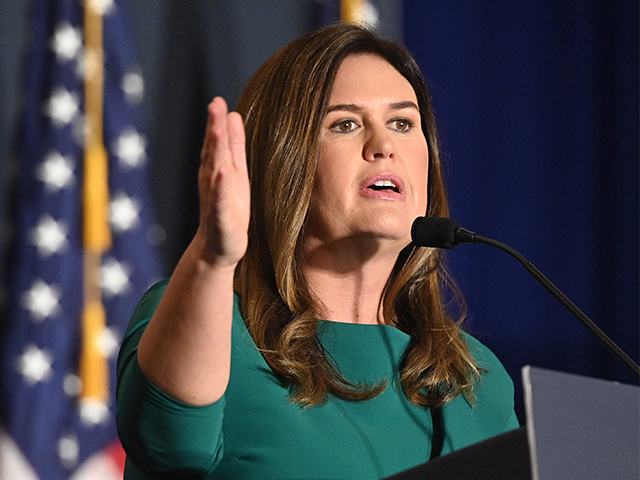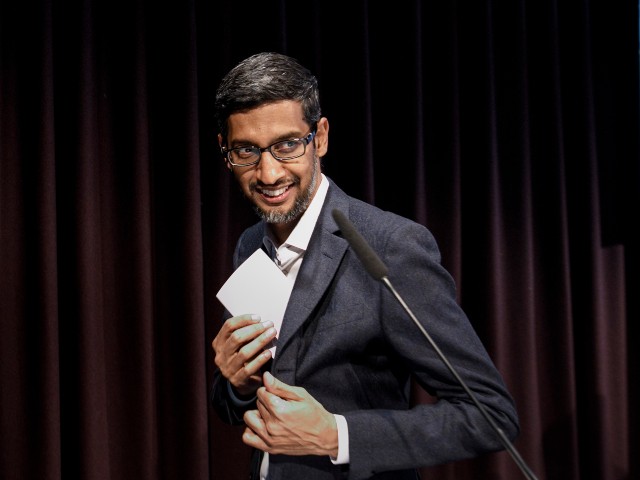Arkansas has joined Utah and Texas in passing a bill requiring age verification for children using social media in this case the Social Media Safety Act. However, the law has attracted criticism from some conservative policy analysts over its explicit carve out for the biggest social media platform for teenagers: Google-owned YouTube.
The Social Media Safety Act requires age verification to show a user is over 18 or else requires minors to have parental consent before starting a social media platform. The Arkansas legislation was passed shortly after Utah enacted a similar law in March. Greg Abbott signed another parental consent bill in Texas last week.

Arkansas Gov. Sarah Huckabee Sanders (Photo by MANDEL NGAN / AFP) (Photo by MANDEL NGAN/AFP via Getty Images)
However, the Arkansas bill was amended to give loopholes to protect Google and Amazon. Specifically, it does not apply to social media companies which own a cloud platform and generate less than 25 percent of its revenue from its social network.
This carve out would protect YouTube, which is owned by Google, which also owns Google Cloud. YouTube also only constitutes 10 percent of Google’s more than $200 billion in revenue, exempting the tech giant on both counts.
According to CNN, Governor Sarah Huckabee Sanders (R) “told reporters that Google and Amazon are exempted from the law.” Politico summarized an interview with the Bill’s sponsor who introduced the amendment to protect Google and Amazon, State Sen. Tyler Dees (R), that “groups and tech companies worked behind the scenes to win exemptions and protections for some of the biggest social media companies”
Dees defended the loophole, “The purpose of this bill was to empower parents and protect kids from social media platforms, like Facebook, Instagram, TikTok and Snapchat. We worked with stakeholders to ensure that email, text messaging, video streaming, and networking websites were not covered by the bill.”
In a comment to Breitbart News, a spokeswoman for Gov. Sanders said the bill was simply a first step to wider regulation of Big Tech.
“The legislation was aimed at social media companies to target the proven harm they have on children’s mental health. The law the Governor signed requires social media companies to verify the age of all new Arkansas users – and if an account holder is under 18, they’ll need their parents’ permission,” said the spokeswoman.
“For years, social media companies have gotten away with exploiting kids, and it’s proven to have a negative impact on their mental health. The Governor said at the time, this was only the beginning of holding Big Tech accountable and will further support legislation and litigation that protect kids and empowers parents.”
Adam Candeub, a law Professor at Michigan State who served as Donald Trump’s head of telecommunications policy, was disappointed with the exemption. “Trying to regulate Big Tech while protecting Google and Amazon is trying to regulate Colas while exempting Coke and Pepsi.”
Candeub, who has worked with the Utah in crafting parental consent laws hopes that Arkansas will amend the law to remove the protections for Google and Amazon.
Clare Morell, senior policy analyst at the Ethics and Public Policy Center, said the exemption set an unhelpful precedent. “Exempting YouTube and Amazon’s Twitch will hinder the effectiveness of Arkansas’s law, particularly given the documented research on how harmful YouTube is for children,” said Morell. “And giving certain Big Tech companies, and not others, a free-pass also sets a concerning precedent for future legislative efforts.”
Mike Davis, founder and president of the Internet Accountability Project, said the bill was a good first step, but that streaming services should also be held accountable. “The bill is a good first step because it focuses on the most pernicious platforms like TikTok and Instagram,” said Davis.
“However, legislators should continue their work to ensure parents are empowered to protect young people in Arkansas from harmful content on YouTube and Twitch,” Davis continued. “Other states would be wise to pursue similar legislation as well. One such state that’s passed model legislation is Utah.”
Jon Schweppe, policy director at the American Principles Project said the exemptions “show the power of the Big Tech companies not only at the federal level but even in the states.”
“I imagine next year a dozen or so states pass these kinds of bills — it’s going to be important to educate lawmakers that passing them with exceptions for big tech makes them pretty ineffective,” Scheweppe continued. “Advocates felt getting bills through was important first step and the big tech companies could be addressed later — but that’s got to be a priority in next legislative session.”
According to the Pew Research Center 95 percent of teenagers aged 13-17 use YouTube. YouTube is also the app which the highest numbers of teens use “almost constantly.”
Parents should have just as much reason to be concerned about their children using YouTube as any other platform. As Breitbart has reported, videos uploaded by children and teenagers have been recommended to pedophiles by YouTube. Only after pressure on the issue of sexual predators stalking and harassing children on YouTube did the platform stop children from livetstreaming.
The Cloud Storage exception also applies to Amazon’s Twitch, which is the sixth most popular social network for teens according to Pew. As with YouTube, Twitch has had difficulties preventing child predators from exploiting its underaged users.
Despite Dees’ insistence that the bill will cover TikTok and Snapchat, CNN and the Verge both pointed to an exemption that called for “social media company that allows a user to generate short video clips of dancing, voice overs, or other acts of entertainment” could exempt those platforms as well.
Prof. Candeub said the language raises questions. “It appears that the legislature was trying to ensure that TikTok was not exempted, but the language is ambiguous.”
Allum Bokhari is the senior technology correspondent at Breitbart News. He is the author of #DELETED: Big Tech’s Battle to Erase the Trump Movement and Steal The Election.


COMMENTS
Please let us know if you're having issues with commenting.